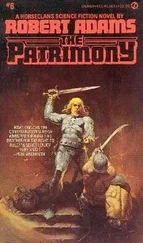Turning to Martine, he said solemnly, “Madame Moray, it is your great honor to be the wife of a very good and most saintly man. For long years we all thought him killed byles Boches, mourned his death, made the repose of his compassionate soul the object of thousands of masses, tens of thousands of candles and millions of heartfelt prayers.
“It was I, Marcel Eudes Noyes, who first discovered today that the saintly Capitaine Milo Moray still lives. Soon all of Paris will know and rejoice, then all of France.”
Colonel Duron had been seated, looking rather stunned as the three grunting, groaning men bore the vast quantities of comestibles and beverages into his house. Overhearing, his head swiveled on his bony, loose-skinned neck. “But of course,” he pronounced slowly, “my poor memory is failing me;that is why your name sounded so very familiar when first Martine wrote to me of you. To think, I greeted you this day, ate across the same table from you . . . yet, in my fast-encroaching senility, I failed to connect facts.”
Martine just looked helplessly from Marcel to Milo to her father. “What in the world are you two babbling about? Tell me, please!”
Duron took his daughter’s hand and drew her down on the bench at his side. “Martine, do you have memory of a man named Henri Gallion? No, you probably would not, you were very young when last you might have heard that name. Henri was badly wounded at the Marne in the Great War; nonetheless, he recovered sufficiently to become a most successful businessman, despite all of the economic problems. But because of his wounds, he was not called to fightles Boches in 1940, though his son was and that young man died trying to hold a line in Flanders. His wife suffered a seizure when the news reached them and she, too, died shortly thereafter.
“His young daughter, Nicole, left the convent school then, to care for her bereaved father. She stood at his side, then led him home weeping after they had watched the arrogant German army march into Paris. But unlike far too many French men and French women, those two would not let matters so rest, would not lower themselves to passive collaboration with the occupying enemy. They carried on the war in their own quiet ways.”
“Henri Gailion sat high in the council of the Resistance, Madame Moray,” put in Marcel Noyes, “and his brave daughter became a courier, her carefully cultivated appearance of youth, modesty and utter innocence saving her in many times and places as she did her most dangerous work for France.”
Duron nodded and continued his recital. “For almost five years, Henri Gailion and Nicole were able to hoodwinkles Boches, leading an overt life and a covert life simultaneously. Then, only a month or less before the liberation of Paris, both father and daughter were taken away by S$ men and Gestapo agents. Poor Gailion himself was savagely tortured, maimed, deliberately crippled.”
Martine paled perceptibly as Marcel interjected,“Les Boches did not ever know just how big a fish they had netted in Henri Gailion. Had either he or little Nicole broken under the questionings and the mistreatments, I shudder to think what might then have chanced, madame, for me and thousands of other loyal French men and women.
“But neither of them broke. Even when the pigs tore out both of Henri’s eyes, drilled through into the quivering nerves of most of his teeth, rammed steel spikes into his fingertips after they already had torn out his nails with pincers. They placed wirings in the most sensitive portions of his body and ran electrical currents through them, burning him severely in many places, they crushed his . . . his masculinities in a small vise . . . and almost all of this, they forced Nicole to watch being done.
“But despite the very worst, Henri never divulged even a hint of his association withla Resistance, nor did Nicole. She was put in prison and there raped repeatedly; he was placed in a prison hospital to recover sufficiently to be sent to a concentration camp in Germany, but before he could be entrained, Paris was liberated.
“Henri Gallion and Nicole were free, yes, as was our Paris, but free as well to slowly starve, for what can a blind jeweler with maimed hands do? Many were the offers of money and of food and fuel, but Henri Gallion had his pride intact still, and he well knew that most or all of those extending help to him were in only barely better condition themselves, and he would take nothing, rather having Nicole sell his available stock, then family pieces to eke out a precarious existence.
“Madame Moray, when there was nothing left to sell, Nicole was become frantic, for she never had learned any sort of trade. Then a woman she had met in the prison, one Angelique Laroux, a most accomplished courtesan, offered to take Nicole on as an apprentice and journeyed north with her, into Germany, to answer the gold-edged summons of a high-ranking American officer.
“But poor Nicole, whose only sexual experiences had been brutal rapes done upon her in the German prison, her courage failed her at the sticking point and she could not force herself to go through with the arrangement. The man was your husband, Madame Moray, and when he saw her anguish and terror, he gave her his bed and slept himself upon the hard floor.
“Later, when he had been told by Angelique of the tribulations of Nicole and her father, he arranged to sell certain of his personal possessions to the high-ranking officer, a Brigadier Estilles, I believe, and give the value—hundreds of thousands of francs, it was—to Nicole for the proper care of her father. Nicole’s last sight of that selfless man was of him still asleep in the grayness of the dawn, wrapped in a blanket upon the cold floor.
“Both Nicole and Angelique have many times sworn before God that as le Capitaine Moray lay there sleeping, there was a dim, glowing radiance about his face and his head, such as the saints owned. And already, one hears, many of those who this day have been touched by him attest that a good, warm tingling of the power of grace has passed from his hand to them, and one of those so attesting is a priest of God, Father Arsenne.
“Madame, it is very possible that your good husband is truly a saint.”
A little before sundown, Captain Wahrn Mehrdok stalked into the quarters of the priests, saying, “Mosix, chase this passel of parasites out of here or come outside with me. We two need to talk . . . alone, if you please.”
The old priest feared Wahrn or any other man who had proved that he could or would stand up to parochial authority, and he was not about to go outside his comfortable home into the darkening countryside with the captain. Grudgingly, therefore, he told the six younger priests and acolytes to leave, but signed them all not to go far.
When the last of the six had shuffled out, Captain Mehrdok took one of the now-vacated seats at the dining table, used his belt knife to take a thick slice from the veal roast, slapped the slab of meat between two slices of pale-brown wheaten bread and took a big bite before beginning to talk.
“Cat-killed or not, this is tasty veal, Mosix. Don’t look so damned surprised—we all heard of how you holy-mouthed half that calf carcass out of Djim Dreevuh’s wife. I’d advise you to savor this veal fully, because it may well be the last food you get without working for it—physically working, Mosix, not just running your mouth, you and the rest of your crew.”
Mosix drew himself up, his eyes shining his wrath. “You lie, Wahrn Mehrdok, for the council would never . . .”
The captain swallowed his mouthful of bread and veal, then grinned. “The entire council has, as of last night, read the significant parts of the old journals, the written records of our fathers and theirs, Mosix, and precious few of them are stupid men, you know it and I know it. So don’t expect too very much support to be voted you in council, from now on.
Читать дальше












